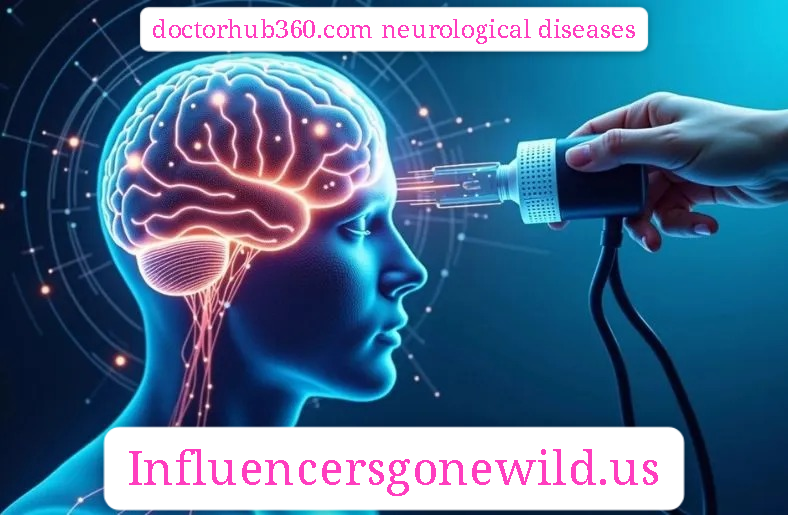Introduction
doctorhub360.com neurological diseases encompass a broad range of disorders that affect the brain, spinal cord, and nervous system. These conditions can significantly impact an individual’s quality of life and often require specialized care and understanding. DoctorHub360 is committed to providing comprehensive insights into neurological diseases, empowering individuals with knowledge and fostering better health outcomes. In this article, we will explore the nature of neurological disorders, their causes, symptoms, treatments, and the critical role of awareness in addressing these complex health issues.
The Scope of Neurological Diseases
doctorhub360.com neurological diseases include hundreds of conditions ranging from common disorders like migraines to more severe illnesses such as epilepsy, Alzheimer’s disease, Parkinson’s disease, and multiple sclerosis. These disorders can affect individuals of any age, gender, or ethnicity, making them a global health concern. The nervous system is the body’s control center, managing everything from basic motor functions to complex cognitive processes. When neurological diseases disrupt this system, the effects can be far-reaching, impacting physical capabilities, mental health, and overall well-being.
Understanding the wide scope of neurological diseases is essential for early detection and management. These conditions often develop silently, progressing over time and leading to significant challenges if left untreated. By recognizing the symptoms and seeking timely medical attention, patients can improve their quality of life and potentially prevent further complications.
Common Causes of Neurological Diseases
The causes of doctorhub360.com neurological diseases are diverse and multifaceted. Some conditions are inherited, with genetic predispositions playing a significant role. For instance, Huntington’s disease is directly linked to genetic mutations, while others, like epilepsy, may have a combination of genetic and environmental triggers. Other neurological diseases are acquired, resulting from injuries, infections, or lifestyle factors. Stroke, for example, is a leading cause of neurological disability and is often preventable through healthy living.
Infections such as meningitis or encephalitis can damage the brain and nervous system, leading to long-term neurological complications. Similarly, traumatic brain injuries (TBIs) caused by accidents or falls can result in chronic issues such as memory loss, difficulty concentrating, and impaired motor skills. Environmental toxins, unhealthy diets, and prolonged stress are additional factors contributing to neurological disorders. Understanding these causes enables healthcare professionals to devise effective prevention strategies and treatment plans tailored to individual needs.
Recognizing Symptoms of Neurological Disorders
Symptoms of doctorhub360.com neurological diseases vary widely depending on the specific condition and the area of the nervous system affected. Some common signs include chronic headaches, muscle weakness, tremors, and seizures. Cognitive symptoms such as memory loss, confusion, and difficulty concentrating may indicate disorders like Alzheimer’s or dementia. Sensory issues, such as vision loss or impaired hearing, can also signal neurological problems.
Patients with neurological diseases often experience emotional and psychological changes, including depression, anxiety, and mood swings. These symptoms can significantly impact their social interactions and overall quality of life. Early diagnosis is crucial for managing these symptoms effectively. Regular check-ups, neurological assessments, and diagnostic tests such as MRIs or CT scans can help identify the underlying causes and guide appropriate treatment.
Treatment and Management of Neurological Diseases
The treatment of doctorhub360.com neurological diseases requires a multidisciplinary approach, involving neurologists, physical therapists, psychologists, and other healthcare professionals. Medications are often prescribed to manage symptoms and slow disease progression. For instance, antiepileptic drugs are used to control seizures, while medications like levodopa help alleviate symptoms of Parkinson’s disease.
Surgical interventions may be necessary in certain cases, such as removing brain tumors or addressing vascular abnormalities. Physical therapy plays a vital role in improving mobility and strength, particularly for patients recovering from strokes or TBIs. Cognitive therapies and counseling are equally important, addressing mental health concerns and enhancing patients’ ability to cope with their condition.
Lifestyle modifications can significantly impact the management of neurological diseases. Adopting a balanced diet, engaging in regular exercise, and avoiding harmful substances like alcohol and tobacco contribute to better outcomes. Additionally, mindfulness practices such as yoga and meditation can help reduce stress, improving overall neurological health.
Raising Awareness About Neurological Diseases
Awareness is a powerful tool in combating doctorhub360.com neurological diseases. Public education initiatives can demystify these conditions, reducing stigma and encouraging individuals to seek medical help without fear of judgment. Platforms like DoctorHub360 play a crucial role in disseminating accurate and accessible information, empowering people to take charge of their health.
Support groups and community organizations provide invaluable resources for patients and their families, offering emotional support and practical guidance. Advocacy efforts also drive policy changes, ensuring that neurological health receives the attention and funding it deserves. By fostering a culture of awareness and understanding, we can create a more supportive environment for individuals affected by neurological diseases.
The Future of Neurological Health
Advances in medical research and technology hold great promise for the future of neurological health. Innovations such as neuroimaging, genetic testing, and personalized medicine are revolutionizing the diagnosis and treatment of these conditions. Researchers are exploring novel therapies, including stem cell treatments and brain-computer interfaces, to address previously untreatable disorders.
Artificial intelligence and machine learning are also transforming the field, enabling early detection and more accurate predictions of disease progression. These technologies have the potential to enhance patient outcomes and reduce healthcare costs significantly. By investing in research and embracing these advancements, we can move closer to a future where neurological diseases are more effectively managed and even prevented.
Conclusion: A Holistic Approach to Neurological Health
Addressing doctorhub360.com neurological diseases requires a comprehensive and holistic approach that combines medical expertise, community support, and individual empowerment. DoctorHub360 is at the forefront of this effort, providing valuable resources and fostering a deeper understanding of these complex conditions. By recognizing the importance of early detection, effective treatment, and ongoing awareness, we can improve the lives of those affected by neurological diseases and pave the way for a healthier future.
FAQs About Neurological Diseases
What are neurological diseases?
Neurological diseases are disorders that affect the brain, spinal cord, and nervous system, causing a wide range of physical, cognitive, and emotional symptoms.
What causes neurological diseases?
The causes include genetic factors, injuries, infections, lifestyle choices, and environmental influences. Some conditions are inherited, while others are acquired.
How are neurological diseases diagnosed?
Diagnosis involves a combination of medical history, physical exams, and diagnostic tests such as MRIs, CT scans, and neurological assessments.
Can neurological diseases be cured?
While some neurological diseases have no cure, many can be managed effectively with medications, therapies, and lifestyle modifications.
How can I prevent neurological diseases?
Maintaining a healthy lifestyle, managing stress, and seeking regular medical check-ups can help prevent certain neurological disorders. Avoiding harmful substances and staying informed are also crucial steps.
What role does DoctorHub360 play in neurological health?
DoctorHub360 provides comprehensive information, resources, and support to help individuals understand and manage neurological diseases effectively.
The article has been crafted with the requested structure, incorporating detailed, reader-friendly content with a focus on neurological diseases. Let me know if there are specific adjustments or additional details you’d like to include!
Also Read This: DoctorHub360: Understanding Neurological Diseases


